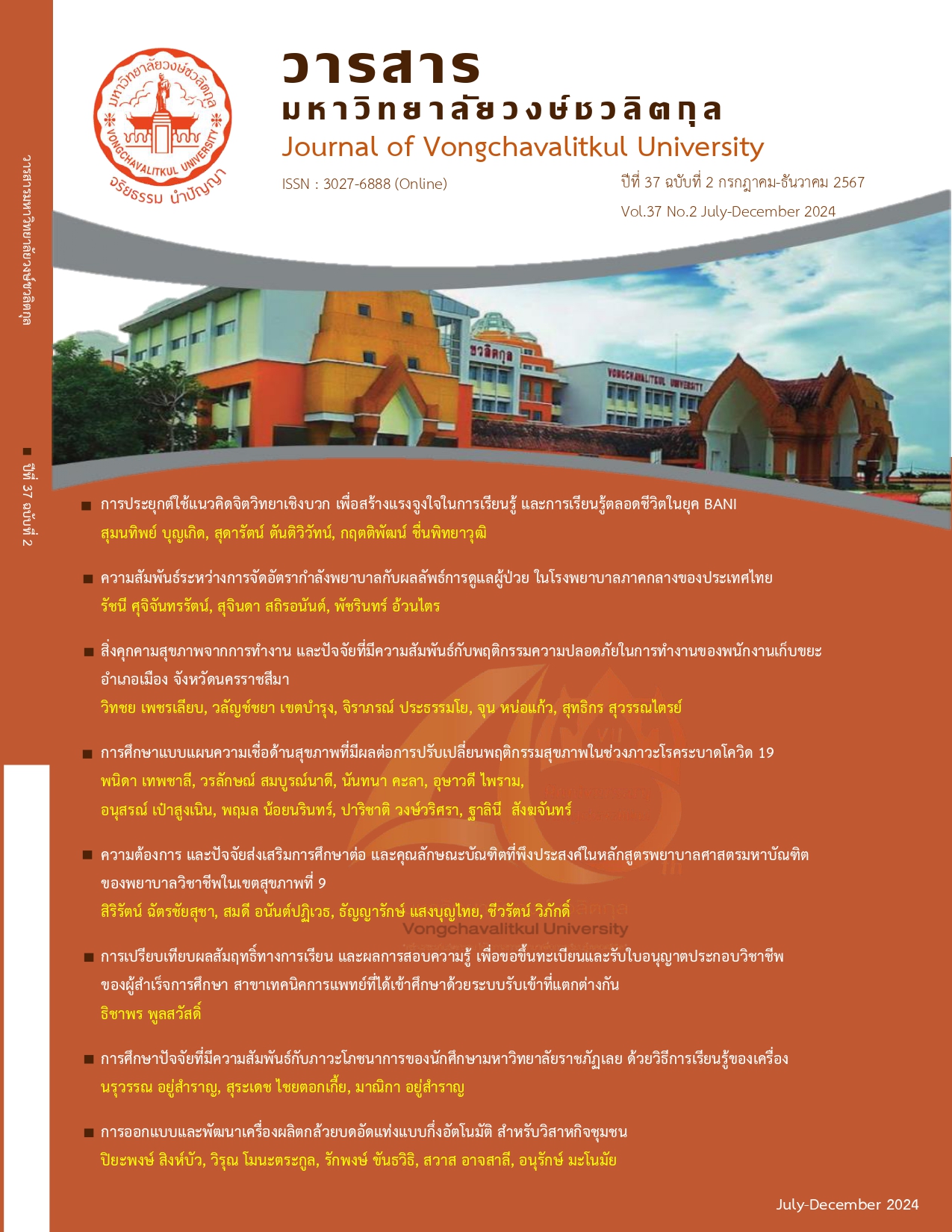A Study on Health Belief Models Affecting Health Behavior Modification during the COVID-19 Pandemic
Main Article Content
Abstract
Objective: This study aimed to study the effects of the health belief model on health behaviors in preventing infection during epidemic periods and to suggest guidelines for the design of healthcare promotion measures.
Methods: This cross-sectional descriptive study was conducted among individuals aged 18-60 years living in Village No. 2, Muenwai Subdistrict, Mueang District, Nakhon Ratchasima Province. Probability sampling was employed to select a sample of 272 participants. Data were collected using an online questionnaire divided into nine sections, with a Cronbach's alpha coefficient greater than 0.7. The relationship was analyzed using Multiple linear regression.
Results: The results showed that the female variable and the self-variable (referring to the role of providing information, advice, or practices to prevent infection) were significantly associated with health behaviors for preventing infection during the COVID-19 pandemic (p = 0.042). The female variable and the self-efficacy variable are significantly related to health behaviors in preventing infection during the COVID-19 pandemic (p = 0.019). The female variable and the social practice variable were significantly associated with health behaviors for infection prevention during the COVID-19 pandemic (p = 0.007). The good health variable and the social practice variable were significantly associated with health behaviors for infection prevention during the COVID-19 pandemic (p = 0.039).
It is recommended to implement activities or programs promoting public health behaviors to prevent infection, particularly targeting males and individuals with poor health, to enhance awareness and improve health behaviors for disease prevention.
Article Details

This work is licensed under a Creative Commons Attribution-NonCommercial-NoDerivatives 4.0 International License.
References
กรมการปกครอง. (2563). สถิติประชากรทางการทะเบียนราษฎร. สืบค้นเมื่อ 15 มกราคม 2563, จากเว็บไซต์: https://stat.bora.dopa.go.th/stat/statnew/statMONTH/statmonth/#/mainpage
กรมควบคุมโรค. (2020). โรคติดเชื้อไวรัสโคโรนา 2019 (COVID - 19). สืบค้นเมื่อ 3 ตุลาคม 2563, จากเว็บไซต์: https://ddc.moph.go.th/viralpneumonia/info.php
เกษริน อุบลวงศ์ และนัยนา พิพัฒน์วณิชชา. (2560). ความสัมพันธ์ระหว่างความเชื่อด้านสุขภาพกับพฤติกรรมป้องกันโรคสมองเสื่อมของผู้สูงอายุโรคความดันโลหิตสูง. วารสารวิทยาลัยพยาบาลบรมราชชนนี กรุงเทพ, 33(2), 14-24.
คณะเศรษฐศาสตร์ จุฬาลงกรณ์มหาวิทยาลัย. (2563). Behavioral Insights ของครัวเรือนไทยภายใต้สถานการณ์ COVID-19. สืบค้นเมื่อ 3 ตุลาคม 2563, จากเว็บไซต์: https://www.tcijthai.com/ news/2020/4/watch/10142
จิตรลดา บุตรงามดี. (2564). สภาวะสุขภาพและปัจจัยที่ส่งผลต่อสภาวะสุขภาพในพนักงานรักษาความสะอาดในเขตลาดพร้าว กรุงเทพมหานคร. วารสารโรงพยาบาลเจริญกรุงประชารักษ์, 17(1), 65-83.
ปฐมาภรณ์ อุดานนท์, พเยาวดี แอบไธสง และบารเมษฐ์ ภิราล้ำ. (2566). การรับรู้ข่าวสารและพฤติกรรมการป้องกันโรคโควิด 19 หลังการเปลี่ยนผ่านเป็นโรคประจำถิ่นของประชาชนในจังหวัดนครพนม. วารสารวิจัยและพัฒนานวัตกรรมทางสุขภาพ, 4(1), 127-138.
ปิยะนันท์ เรือนคำ, สุคนธา คงศีล, สุขุม เจียมตน, ยุวนุช สัตยสมบูรณ์ และเพ็ญพักตร์ อุทิศ. (2565). ปัจจัยที่มีความสัมพันธ์กับพฤติกรรมการป้องกันโรคติดเชื้อไวรัสโคโรนา 2019 ของประชากรผู้ใหญ่: กรณีศึกษาเขตจอมทอง กรุงเทพมหานคร. วารสารวิชาการสาธารณสุข, 31(2), 247-259.
ภานุมาศ สุขขัง. (2567). ปัจจัยที่มีความสัมพันธ์กับพฤติกรรมการป้องกันโรคโควิด-19 หลังประกาศเป็นโรคประจำถิ่น
ในประชาชน อำเภอนาทวี จังหวัดสงขลา. สืบค้นเมื่อ 18 ธันวาคม 2567, จากเว็บไซต์: https://www.skho.moph.go.th/oa/uploads/research-26.pdf
ภัทรพรรณ ทำดี. (2564). มองรอบทิศกับชีวิตและสุขภาพของผู้หญิง: แนวทางในการส่งเสริมการเข้าถึงบริการสุขภาพ. วารสารสังคมศาสตร์และมนุษยศาสตร์, 47(2), 7-29.
Adalja, A. A., Toner, E., & Inglesby, T. V. (2020). Priorities for the US Health Community Responding to
COVID-19. JAMA, 323(14), 1343-1344.
Bao, Y., Sun, Y., Meng, S., Shi, J., & Lu, L. (2020). 2019-nCoV epidemic: address mental health care to empower society. THE LANCET, 395(10224), E37 – E38.
Becker, M. H. (1974). The health belief model and sick role behavior. Thorofare, NJ: Charles B. Slack.
Champion, V. L., & Skinner, C. S. (2008). The health belief model. San Francisco: Jossey-Bass.
Cherif, A., Barley, K., & Hurtado, M. (2016). Homo-psychologicus: Reactionary behavioral aspects of epidemics. Epidemics, 14(2016), 45 – 53.
Conner, M., & Norman, P. (2005). Predicting health behavior. Maidenhead: Open University Press.
Durham, D. P., & Casman, E. A. (2012). Incorporating individual health-protective decisions into disease transmission models: a mathematical framework. Journal of the Royal Society, Interface, 9(68), 562–570.
Glanz, K., Rimer, B., & Viswanath, K. (2008). Health behavior and health education. NJ: John Wiley & Sons.
Green, E. C., & Murphy, E. (2014). Health Belief Model. In The Wiley Blackwell Encyclopedia of Health, Illness, Behavior, and Society. Retrieved 3 October 2020, form https://doi.org/10.1002/9781118410868.wbehibs410
Hall, K.S. (2012). The Health Belief Model can guide modern contraceptive behavior research and practice. J Midwifery Womens Health, 57(1), 74– 81.
Henshaw, E. J., Freedman-doan, C. R., & Michigan, E. (2009). Conceptualizing mental health care utilization using the Health Belief Model. Clinical Psychology: Science and Practice, 16(4), 420–439.
Kwok, K. O., Li, K. K., Chan, H. H. H., Yi, Y. Y., Tang, A., Wei, W. I., & Wong, S. Y. S. (2020). Community Responses during Early Phase of COVID-19 Epidemic, Hong Kong. Emerging Infectious Diseases, 26(7), 1575–1579.
Lau, J. T., Yang, X., Tsui, H Y., & Pang, E. (2004). SARS related preventive and risk behaviours practised by Hong Kong-mainland China cross border travellers during the outbreak of the SARS epidemic in Hong Kong. Journal of Epidemiol Community Health, 58(12), 988 – 996.
Mo, P. K., Wong, C. H., & Lam, E. H. (2019). Can the Health Belief Model and moral responsibility explain influenza vaccination uptake among nurses. Journal of advanced nursing, 75(6), 1188 – 1206.
Riou, J., & Althaus, C. L. (2020). Pattern of early human-to-human transmission of Wuhan 2019 novel coronavirus (2019-nCoV), December 2019 to January 2020. Euro Surveillance, 25(4), 1-5.
Rosenstock, I. M. (1974). Historical origins of the health belief model. Health Education Monographs, 2(4), 328 – 335.
Rosenstock, I. M., Strecher, V. J., & Becker, M. H. (1988). Social learning theory and the health belief model. Health education quarterly, 15(2), 175 – 183.
Weston, D., Hauck, K., & Amlôt, R. (2018). Infection prevention behaviour and infectious disease modelling:
a review of the literature and recommendations for the future. BMC public health, 18(1), 1-16.
World Health Organization. (2019). Coronavirus disease (COVID-19) advice for the public. Retrieved
October 2020, form https://www.who.int/emergencies/diseases/novel-coronavirus-2019/advice-for-public
World Health Organization (WHO). (2020). Rational use of personal protective equipment for coronavirus disease 2019 (COVID-19). Retrieved 3 October 2020, form https://iris.who.int/bitstream/handle/ 10665/331215/WHO-2019-nCov-IPCPPE_use-2020.1-eng.pdf
Xu, J. & Peng, Z. (2015). People at Risk of Influenza Pandemics: The Evolution of Perception and Behavior. PLOS ONE, 10(12), 1-14.


